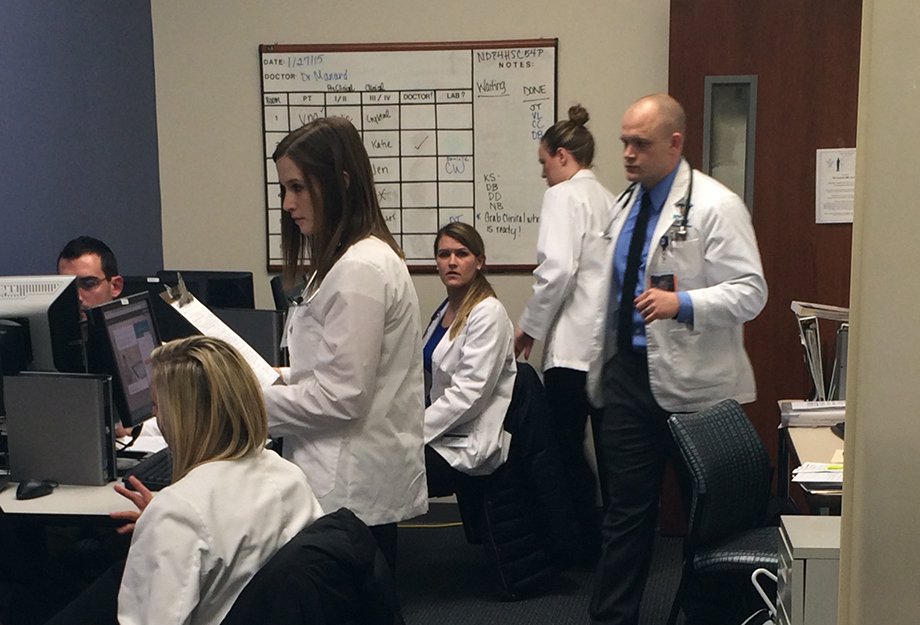PA Students Serve Their Community at the SLU Health Resource Center
It is an unfortunate reality that in the St. Louis region, and across the country, there are many individuals that cannot afford adequate healthcare services. Over 25 years ago, students and faculty from the Saint Louis University (SLU) Medical School acknowledged this reality and set in motion a plan to try to help those individuals by founding the SLU Health Resource Center (HRC). The HRC was founded to provide primary healthcare services in an academic environment; these services would be free of charge to the underserved people in the community.
For years, the HRC was only able to be open one day a week, In 2014, however, the SLU School of Medicine supported the university’s Physician Assistant (PA) program as it offered to open an HRC Extension Clinic to operate on another day of the week. The extension clinic would operate with PA students and SLUCare physicians. As the extension clinic grew, the PA program included service in the HRC a part of its curriculum. Now, all SLU PA students are able to provide temporary primary care to the uninsured or underinsured patients that come to the clinic seeking help.
Students who wish to get more involved with the HRC can apply to become student leads. These students work with the other students and volunteer physicians that supervise the clinic to ensure that operations are running smoothly, and standards of care are being met. In 2019, Allison McNiell and Molly Karl were two of the PA students who served as student leads at the HRC.
In addition to the primary mission of the HRC – helping patients – McNeill discussed how beneficial the clinic is for the development of the PA students volunteering their time.
“Our pre-clinical and clinical year students work together to practice interviewing, diagnosing, treating and answering questions for the patients that come to the HRC,” McNeill said. “Students are encouraged to do as much as they are able, and the supervising physician is there to help fill in the gaps and educate students on ways to improve as a healthcare provider.”
Karl appreciated that the HRC allowed students to not only get experience working with patients, but also collaborating with students and professionals from other disciplines to provide care.
“The HRC offers a great opportunity for us to collaborate with the students from different areas – Medical School students, Nursing students and other Allied Health students,” Karl said. “In addition, the HRC also has specialty clinics including women’s health, heart health and psychiatry that we refer our patients to in order to provide the best care.”
Part of what inspired McNeill to become a student lead at the HRC was seeing other PA students evolve as they gained more experience treating patients.
“I love watching my peers develop confidence as a medical provider. For many of our pre-clinical students, the HRC is the first place they are putting their knowledge to use, and it’s exciting to see everything come together for them,” McNeill said.
At the end of the day, though, McNeill is thankful because the HRC allows her and her fellow PA students to do what is most important to them.
“The HRC allows us to act out our biggest motivation to decide to work in healthcare: helping others.”
In the years since its founding, the SLU HRC has expanded to operate multiple days a week and includes students from the School of Medicine, School of Nursing, College of Arts and Sciences, Physician Assistant program, Physical Therapy program and various other disciplines. Each year, the clinic is able to help thousands of patients thanks to the students and supervising physicians volunteering their time and services.
The HRC is able to operate primarily on donations received from individuals and organizations in the community.
Saint Louis University is a Catholic, Jesuit institution that values academic excellence, life-changing research, compassionate health care, and a strong commitment to faith and service. Founded in 1818, the University fosters the intellectual and character development of nearly 13,000 students on two campuses in St. Louis and Madrid, Spain. Building on a legacy of more than 200 years, Saint Louis University continues to move forward with an unwavering commitment to a higher purpose, a greater good.
